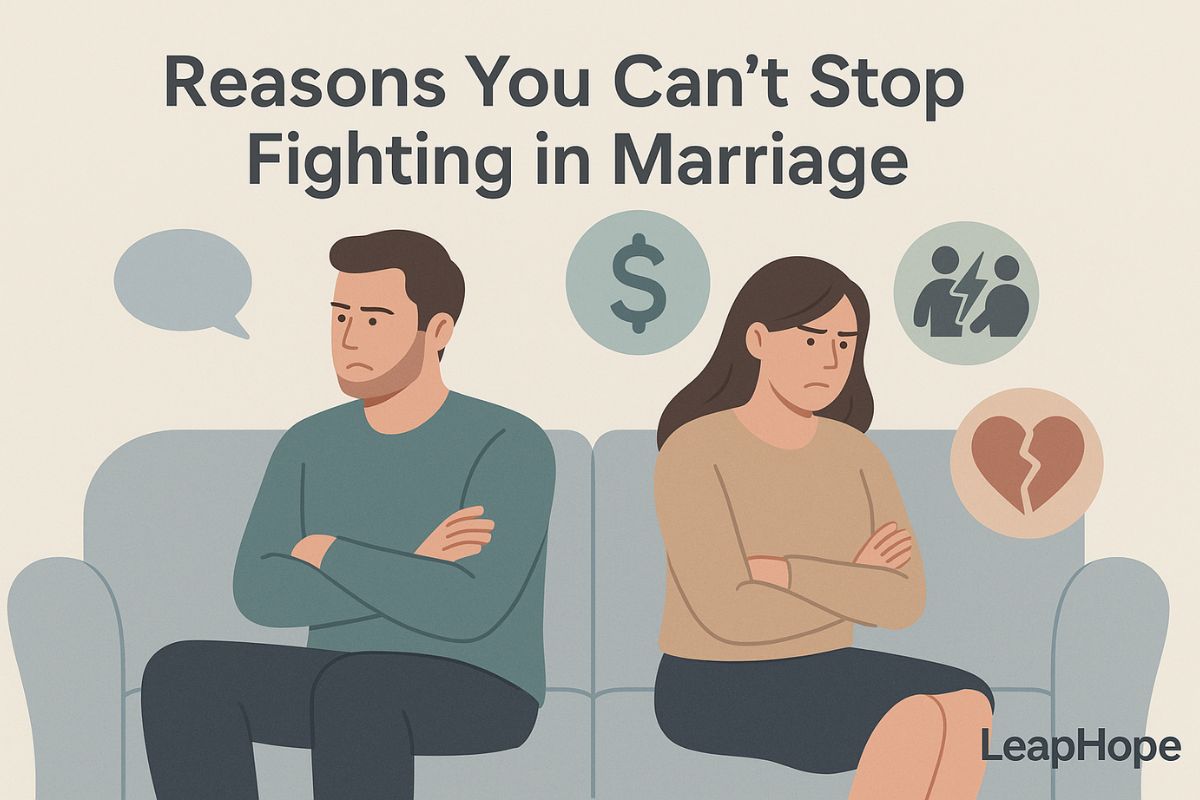Do you ever wonder why the smallest things turn into big arguments with your partner? Maybe it’s about money, chores, parenting—or sometimes, nothing at all. You start with one issue, but somehow it spirals into the same fight you’ve had a hundred times before.
If this sounds familiar, you’re not alone.The Gottman Institute reveals that approximately 69% of marital disputes are centered on ongoing issues that never truly get resolved. They continue resurfacing, no matter how much one tries to avoid them.
Constant fighting is not an indication that the marriage is broken but merely points toward the patterns moving under the surface. Once you understand why it keeps happening, you can start breaking the cycle.In this article, we’ll uncover 9 real reasons you can’t stop fighting in marriage, supported by research, therapist insights, and even real voices from couples on Reddit and Quora who’ve been there too.
Here Are 9 Reasons You Can’t Stop Fighting in Marriage
1. Communication Breakdowns
The fog of most fights in marriages is really about what is either said or better remain unsaid. One person feels unheard, another feels misunderstood, and the two start to scream louder versions of the same arguments.
A common refrain across Reddit’s r/relationship_advice is: “We are not fighting about dishes, we are fighting because I don’t feel listened to.” Frustration mounts until the slightest things set off an explosive argument.
📊 Stat to Know: As per the American Psychological Association, 65% of couples who divorce state problematic communication as one of the biggest reasons for their split.
It is that once couples start conversing, they start to talk past each other- blaming and accusing instead of really listening.- reacting instead of responding.
What would be the cure? Slow down and repeat-back what is heard: “So you are upset because…”. This little change can turn a fight into a conversation that will make you both feel heard.
2. Unmet Emotional Needs
Sometimes fights aren’t about chores, bills, or parenting-at least not in the real sense of it. They are about not feeling acknowledged and valued. When one partner feels lonely or ignored or feels there is an emotional disconnect between them, the frustration comes out in small arguments.
One such declaration made on Quora: “We don’t fight about the dishes-we fight because I feel invisible in my own marriage.” Such emotional neglection breeds silent resentment, which, of course, manifests in eruptions of fighting.
📊 Stat to Know: In a 2023 survey conducted by The Gottman Institute, emotional disconnection was at the top of the list as the reason why 80% of couples sought therapy.
It rarely turns out that somebody has forgotten to take out the trash. Far from it; it ultimately boils down to what the person forgetfulness means to the other: “Do you care about me? Do I matter to you?”
The solution? Instead of arguing about the thing in question, hear this: “What do you need me to do for you right now?” In many cases, when the deeper need is finally articulated, the fight suddenly disappears.
3. Money Stress and Finances
Few things spark fights like money. Who spends what, how much to save, or even whether a purchase was “worth it.”
It’s not really about the price tag—it’s about security, priorities, and trust.
On Reddit, one frustrated partner wrote: “We don’t fight because I bought coffee. We fight because he thinks it means I don’t care about our future.” That’s the truth about money fights—they represent bigger fears.
📊 Stat to know: According to a study by Ramsey Solutions, money ranks second as the most common cause of divorce, with 41% of couples reporting that financial stress causes them to engage in constant conflict. If you and your partner fight about money-whether to spend or to save-it is never really about the money; it is about values and how respected they feel in that relationship.
The fix? Use “we” language (“How can we save for this?”) instead of “you always.” It turns money from a battlefield into a shared plan.

4. Different Conflict Styles
Different Conflict Styles Some couples are not fighting over the issue, but because of the way they either argue or interact. One wants to talk it out immediately; the other shuts down and desires space. This mismatch creates a disengagement dance—the chase-wrath scenario whereby either one of the partners ends up frustrated. Someone on Quora wrote, “I want to resolve things immediately, but my husband goes silent. I feel abandoned, and he feels attacked.” Neither style is “wrong,” yet their opposing styles will rapidly turn the smallest quarrel into an exaggerated one.
📊 Stat to know: Research from the University of Michigan found couples with mismatched conflict styles are twice as likely to report frequent arguments than couples sharing conflict styles.
It is not what you argue about; it is wondering whether your fight becomes a chase and retreat game that leaves both partners feeling unheard.
The solution? Set up a compromise. If one partner needs space, they decide together on a certain time to return to the subject so that no one feels unacknowledged or forced to profess an intolerance for argument when they simply aren’t ready.
5. Past Resentments and Old Wounds
Ever notice how one argument seems to drag up every fight you’ve ever had? That’s not bad memory—it’s unhealed resentment. When old hurts never get fully resolved, they sit quietly in the background until another fight brings them back up.
On Reddit, one spouse shared: “We’ll argue about laundry, and suddenly we’re rehashing a fight from two years ago. It never really goes away.” This happens because the original wound wasn’t healed, so it keeps bleeding into today’s conflicts.
📊 Stat to know: Per an American Psychological Association survey, 74% of couples who argue frequently state that they are fighting about the same issues repeatedly.
When fights start going back down the road of the past, it is usually less about actually dealing with the issue at hand and more about dealing with the unsettled pain left.
The fix would be: Instead of allowing a new grudge to build upon another, stop and ask: “Are we fighting about this moment, or about something that still hurts from before?” Putting a name to the wound is the first step in healing.
6. Parenting Disagreements
Parenting can either pull couples closer or farther apart. When one partner feels that the other is intolerant or just does not have discipline, these major differences can give rise to feelings of being on opposing teams against each other.
One parent wrote on Quora: “We argue because he thinks I’m too stern, and I find him too lenient. The kids can sense these tensions, making things even worse.” These fights aren’t really about the children; they’re about the respect, value, and acknowledgment of the parents.
📊 Stat to know: The American Psychological Association indicates that conflicts generally begin to increase for 67 percent of couples after becoming parents, mainly due to stress and clashing parenting styles.
Truth is, you both want good things for your child; it’s just a matter of clashes about what “good” means.
The fix? Instead of arguing in the heat of the moment, when you are calm, sit down together and talk about your parenting values, agree on common grounds for larger decisions, so that smaller day-to-day decisions will not be the source of further tension.
7. Power Imbalances
Arguments actually erupt whenever a partner starts perceiving that their voice actually does not matter. Maybe one of you always makes the decision at the end of the day, or maybe one person’s career or schedule or needs are apparently valued higher than the other’s. This over time creates an unhealthy power imbalance that manifests itself as confrontations all the time.
“What’s really behind the argument—We fight because I feel like my opinion never counts,” one partner said on Reddit. When someone feels slighted or overshadowed, even the tiniest things become those major clashes.
📊 Stat to know: According to a Journal of Marriage and Family study, power imbalances in decision-making are highly connected to greater marital conflicts and lower satisfaction.
It’s not about money, chores, or parenting; it’s about being fair and respectful.
The fix: Become aware of whose voice gets the final say most of the time. If it is mostly the same person, then pause and include the partner: “What do you think?” Power shared offers trust; imbalance will only breed conflict.

8. Stress From Outside Pressures
This kind of fighting is usually not about the marriage–it is about everything outside of it. Deadlines, financial concerns, health issues, or even pressure from the extended family tend to spill into the relationship. When stress keeps mounting, partners often find themselves venting upon one another, half unwittingly.
Once on Reddit, a husband wrote: “Most of our fights happen after I’ve had a rough day at work. It’s not really about her-it’s about me being stressed.” Outside stress becomes inside conflict, a very typical pattern.
📊 Stat to know: More than three-fourths of people (77%) regularly experience stress that affects their health, mood, and relationships, said the American Institute of Stress. Not to mention: The higher a couple’s stress level, the more they probably fight.
Sometimes the problem isn’t really your partner–it’s that pressure sitting on both your shoulders.
The fix? Stop blaming each other; instead, pinpoint the stress: “I’m not angry at you; I am just overwhelmed right now.” That is already enough to turn a backlash into empathy.
9. Lack of Intimacy
With the loss of physical and emotional intimacy, the frustration trickles down in another way—constant arguments. It’s not always about sex. Sometimes it is about the lack of affection or being close to the partner, or those little gestures that hold hands or share a hug.
A woman tried sharing on Quora: “We fight about silly things but deep down, I just miss feeling close to him.” This is common—what appears to be bickering is often loneliness coming out.
📊 Stat to know: According to a study published on the National Library of Medicine, couples who felt low levels of physical intimacy were more inclined toward frequent conflicts compared to couples who stayed physically connected.
When connection fades, little things start to sting more, and fighting becomes the outlet for unmet needs.
What to do? Get close again… away from the bedroom: touch more, talk honestly, and spend some quiet time together. Intimacy is less about grand gestures and more about small, consistent signs of love.
Final Thought About Reasons You Can’t Stop Fighting in Marriage
Arguing is part of any relationship, and that’s perfectly normal. What happens when you just can’t seem to stop fighting? It’s rarely about the trifles; it’s really about deeper patterns that are emerging.
The good news is that constant conflict does not have to mean that your marriage is collapsing. Actually, according to the Gottman Institute, one key finding that makes divorce more likely is not the number of conflicts that occur between spouses. It is rather the manner in which the debates are handled themselves. Couples who struggle to communicate respectfully with one another, and to restore trust after a fight, will most likely find it difficult to remain together long term.
If your relationship is in a never-ending loop of arguments, then don’t lose hope just yet. Start noticing what lies hidden underneath the fights: is it some unwounded past hurt, is it stress or is it some unmet need? Talking about those issues will actually help more than talking about surface issues.
And there’s no shame if that road seems tough and requires a bit of outside help.
Fighting is a signal; it is not a sentence. Step by step, the marriage can transform from endless fighting toward deeper connection.
FAQs About Reasons You Can’t Stop Fighting in Marriage
1. Is it normal to fight every day in a married life?
Fights once in a while are normal, daily fights are much deeper. It is stress, it is communication, it is an unmet need. Constant bickering is a loud reminder to slow down and observe what is going on.
2. Why do things always turn into bigger fights based on trivialities?
Because rarely are they ever about that triviality. One partner shared on Reddit: “We argue about dishes, but really it’s about me feeling ignored.” Small triggers often represent bigger emotional needs.
3. What cause couples to fight most often?
Studies suggest that the number one things causing arguments are money, communication breakdowns, parenting disagreements, and intimacy-related issues, but below that, the majority of fights really come down to not feeling heard or being valued.
4. How can I stop fighting with my spouse so much?
Change the fight’s logic from winning to understanding the need behind it. Calmly express your concerns; if it escalates, take a break, and come back to it later. Couples who mend after fights tend to enter stronger marriages.
5. Can constant fighting actually destroy a marriage?
Yes, if the fighting is full of blaming and disrespect. But conflict itself isn’t bad; whoever handles it is. The Gottman Institute concluded that couples who resolve their differences respectfully lead a happier life together.
6. Why do couples tend to argue more after kids?
Parenting brings in its wake stress, exhaustion, and new responsibilities. Studies show that 67% of couples have reported an increase in fighting after having children, usually due to having different styles in parenting and very little time for themselves.
7. Should married couples try to avoid fights?
No, because fighting keeps resentment buried deep, only to come out louder. Healthy couples discuss the problem rather than merely sweeping it under the rug.
8. What to do if my partner shuts down during arguments?
That is stonewalling, very common indeed. Instead of pushing ahead, it can be much better to agree on some cool-down time and a set period to return to the discussion; honoring each other’s space can avert an even bigger explosion.
9. Do happy couples even fight sometimes?
Yes, every couple fights. Difference is, the happy couples are interested in the win-win resolution. They listen, validate each other’s feelings, and patch up the relationship after disagreements.
10. When should therapy be considered for constant fighting?
A couple should seek therapy when fighting never ends, when it never gets resolved, when it makes one or both feel unsafe, or when it makes both feel disconnected. Most couples end up going to therapy not because they feel broken, but because they want to re-establish connection.




